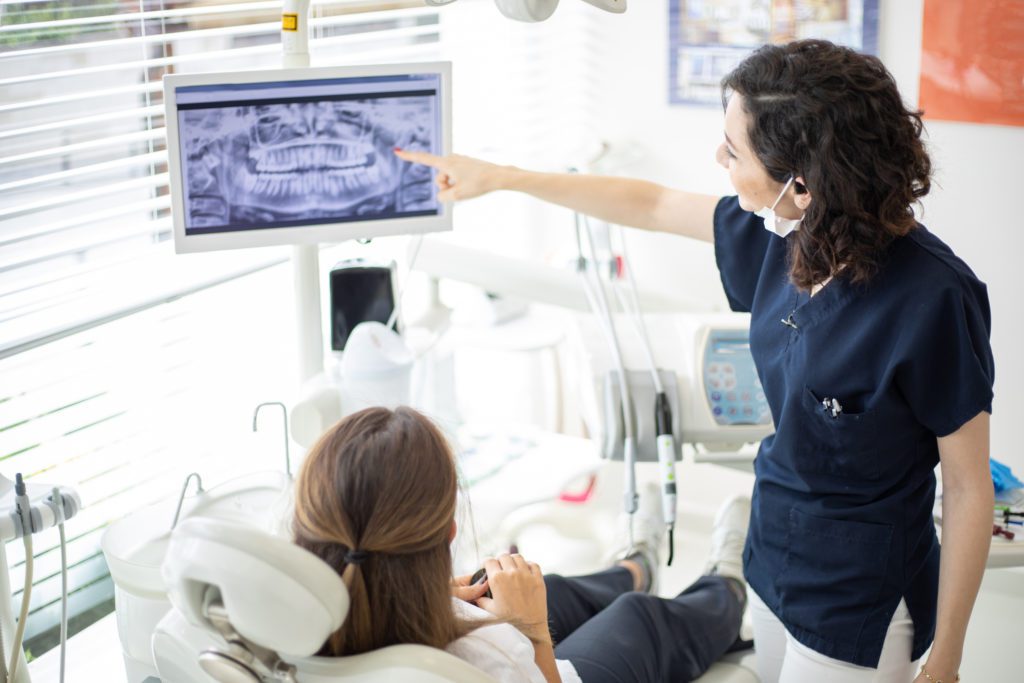Temporomandibular joint disorders (TMD) occur when injury happens to the joint that connects the jawbone to the skull. Some other common causes of TMJ disorders include crooked teeth, missing teeth, and a misaligned bite. Stress, anxiety, and certain types of medication can also exacerbate TMJ symptoms.
TMJ disorders can create painful symptoms that may also damage the tooth enamel. Dr. Matthew Gerald offers comprehensive dental care and TMJ therapy in Vienna, VA. Oral appliances are made from impressions of your teeth and are very effective. Treating TMJ issues can help restore the health of the teeth and gums.

Symptoms of TMJ Disorders
TMJ disorders have the potential to be very painful and diminish a person’s quality of life. Diagnosing it can be difficult since some symptoms are associated with other medical conditions.
It is important to share all the symptoms you are experiencing with Dr. Gerald. He will also do an in-depth exam of your entire mouth to look for signs of malocclusion and/or teeth grinding both of which can lead to TMJ pain. Temporomandibular joint disorders often manifest through:
- Jaw pain
- Tooth sensitivity
- Chronic headaches and migraines
- Jaw clicking and popping
- Joint locking
- Muscle spasms
- Difficulty chewing
- Facial pain
- Teeth clenching and grinding (bruxism)
- Worn teeth
Advanced TMJ Treatment in Vienna, VA
We can help you alleviate pain and prevent damage to the teeth and gums from pressure on the jaw muscles or TMJ misalignment. Dr. Gerald has advanced training in occlusion and can offer patients a comprehensive approach to the diagnosis and treatment of bite problems and TMJ disorders. He takes all aspects of your smile into consideration from teeth and gums to jaw joints and will create a customized treatment plan for your specific needs.
Before choosing a treatment, Dr. Gerald will examine the jaw joint for signs of swelling, tissue deterioration, or joint damage. Some of the most common treatments for temporomandibular joint disorders are jaw exercises, a night guard and other oral appliances.
We may recommend jaw exercises for patients with mild forms of TMJ pain. Gentle jaw exercises, when done properly, can relieve jaw pain and soreness. Oral appliances are similar to mouthguards but are often worn at night.
Many patients who have TMJ disorders clench their jaw and grind their teeth when asleep. Because of this, they can wake up with a headache or jaw pain. Custom oral appliances keep pressure off the jaw and prevent the teeth from wearing down.
If patients have jaw misalignment or severe pain from their TMJ disorder, we may refer them to a local oral surgeon to correct a structural issue. Surgery is needed in the most severe cases to address joint dysfunction.
TMJ Treatment FAQs
How long does TMJ treatment take?
Most adult patients can expect to be under treatment for TMJ between 18 months and 3 years. A quick fix can be found in massages and stretches for the jaw and neck. Unfortunately, it could take a few weeks to a few months before you experience the full benefits.
How long does TMJ swelling last?
Each person’s flare-ups are unique because their causes and triggers are different. The duration of anepisode of TMJ disorder can also depend whether or not the condition is being treated by a dentist. It’s common for flare-ups to last anywhere from a couple of days to a few weeks.
Can TMJ affect your ears?
Ear pain is a common symptom of temporomandibular joint disorder (TMJ), which can also cause discomfort in the jaw, neck, and shoulders. Your temporomandibular joint is connected to your ear canals, which is why TMJ may cause ear pain.
Is TMJ permanent?
The good news is that TMJ disorder can be treated. The best way to treat TMJ disorder is to visit our office! We can help you achieve a full recovery and get your mouth back to its full function.
What are the long term effects of TMJ?
Migraine headaches and other types of severe headaches are associated with TMJ disorders. The temporomandibular joint is a frequently misaligned area of the body. Muscles in the face, neck, and jaw, can get tired from making up the difference of the misalignment, causing pain and swelling.
Does TMJ surgery change your face?
Jaw disproportion causes visual imbalance on the front, side, or all of the face. By repositioning the jaws and correcting the bite, orthognathic surgery can correct facial asymmetry. Your overall facial shape can change drastically by undergoing a corrective jaw procedure.
Request a Consultation for TMJ Treatment in Vienna, VA
Do you want to treat your jaw and facial pain? Schedule a dental appointment with Dr. Gerald and his team on our website or contact our dental office today at (703) 721-4796. Dr. Gerald will recommend the best TMJ treatment for you. With advanced training in occlusion, he is welcoming new patients seeking help with their TMJ pain.
